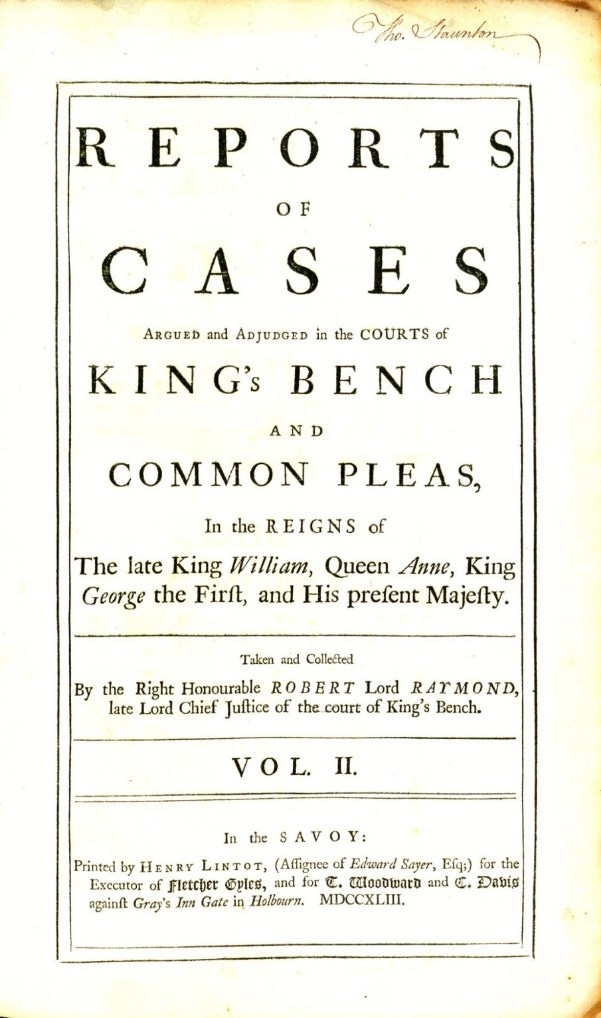Reports of Cases Argued and Adjudged in the Courts of King's Bench and Common Pleas in the reigns of the late King William, Queen Anne, King George the First, and His Present Majesty
by Robert Raymond, Baron Raymond
| Raymond's Reports | |
|
Title page from Reports of Cases Argued and Adjudged in the Courts of King's Bench and Common Pleas, volume two, George Wythe Collection, Wolf Law Library, College of William & Mary. | |
| Author | Raymond, Robert, Baron Raymond |
| Published | London, In the Savoy: Printed by Henry Lintot (assignee of Edward Sayer) For the executor of Fletcher Gyles ..., |
| Date | 1743 |
| Language | English |
| Volumes | 2 volume set |
| Desc. | Folio (32 cm.) |
| Location | Shelf G-5 |
Robert Raymond, Baron Raymond, (1673-1733) was a prominent lawyer, judge, and legal writer. His father helped young Robert gain entry to Gray’s Inn at the age of nine. Called to the bar in 1697, Raymond was retained by the crown as junior counsel in 1702, a great achievement for a lawyer so early in his career. In 1710, Raymond was named solicitor-general and was also electd Parliament. In 1720 he became attorney-general, and by this time had established a reputation as one of the leading barristers in Chancery and the House of Lords. Despite this success, his political career stalled out, due primarily to his affiliation with the Tories during the early part of his career.[1]
In 1724 Raymond retired from politics and became a judge in King’s Bench. By March of 1725 he had been made lord chief justice. His justiceship is remembered for producing learned and elaborate judgments, and Raymond had an influence on the laws of murder, manslaughter, and libel. Raymond had started authoring common-law reports in 1694, and continued to do so until within a year of his death in 1733.[2]
Reports of Cases Argued and Adjudged in the Courts of King’s Bench and Common Pleas was first published in London in 1743. It would eventually reach a fifth edition in 1832. It includes Raymond's case reports from 1694 to 1733. According to eighteenth century judge Lord Mansfield, the first part of the volume, consisting of mostly short notes for private use, is not particularly accurate. However, several other judges found Raymond’s notes to be dependably accurate. They further stated that even if the young Raymond failed to fully comprehend what he was recording, he could have easily fixed his errors over the rest of his long and successful career.[3]
Recent scholarship has revealed that at least some of the accusations of inaccuracy were well founded. For example, Raymond’s report of Ashby v. White, a major case involving the right to vote and misfeasance of a public officer, was found to be highly misleading.[4]
Evidence for Inclusion in Wythe's Library
Listed in the Jefferson Inventory of Wythe's Library as "Ld. Raymond’s 2.v. fol." and given by Thomas Jefferson to Dabney Carr. Both the Brown Bibliography[5] and George Wythe's Library[6] on LibraryThing include the 1743 edition Baron Raymond's King's Bench and Common Pleas reports. The Wolf Law Library followed their suggestions and acquired a copy of the 1743 edition for the George Wythe Collection.
Description of the Wolf Law Library's copy
Rebound in period style with decorative gold bands and rules to spine. Title page of each volume signed "Tho. Staunton."
Images of the library's copy of this book are available on Flickr. View the record for this book in William & Mary's online catalog.
See also
References
- ↑ David Lemmings, "Raymond, Robert, first Baron Raymond (1673–1733)", Oxford Dictionary of National Biography (Oxford University Press, 2004- ), accessed October 6, 2014.
- ↑ Ibid.
- ↑ John William Wallace, The Reporters, Chronologically Arranged: With Occasional Remarks Upon Their Respective Merits, 4th ed., rev. and enl. (Boston: Soule and Bugbee, 1882), 248-251.
- ↑ Ted Sampsell-Jones, "The Myth of Ashby v. White," University of St. Thomas Law Review (2010-2011): 40-59.
- ↑ Bennie Brown, "The Library of George Wythe of Williamsburg and Richmond," (unpublished manuscript, May, 2012) Microsoft Word file. Earlier edition available at: https://digitalarchive.wm.edu/handle/10288/13433.
- ↑ LibraryThing, s.v. ""Member: George Wythe," accessed on May, 22, 2014.

